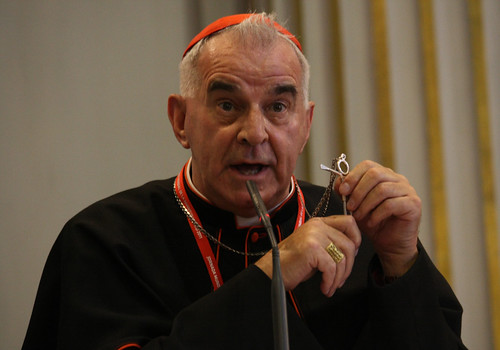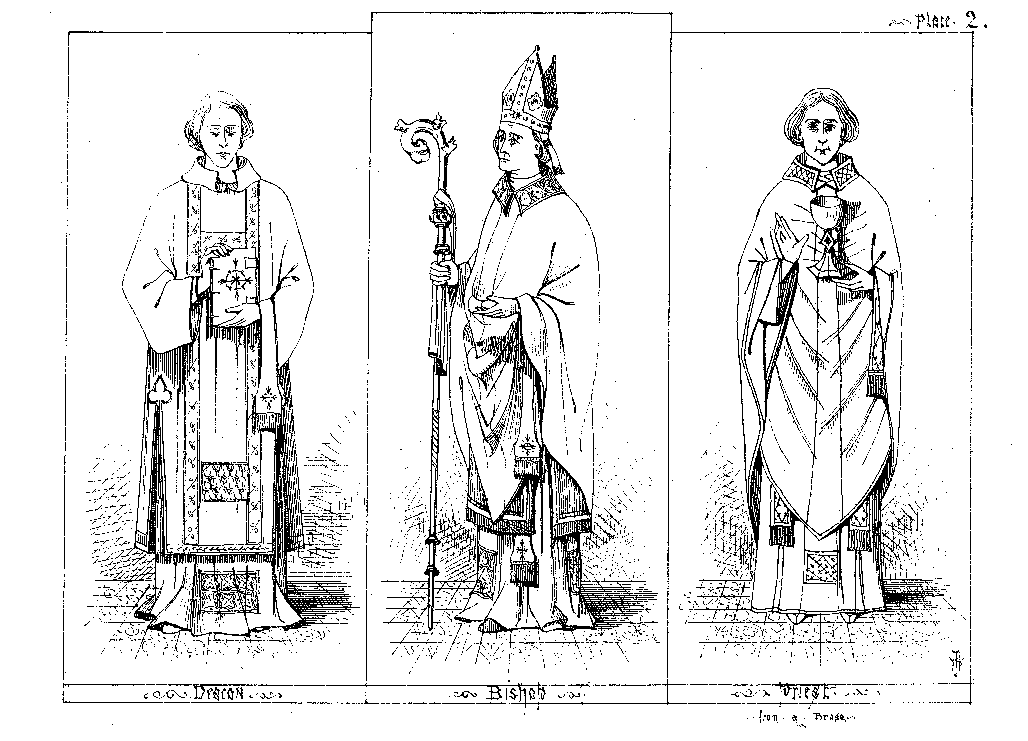 The presence of clerics within the Catholic Church is, to many critics, inside and outside the Church, a problem and stumbling block. From the outside the Roman Catholic Church can seem like a “notoriously clerical affair”. It is often perceived that having a ‘clerical class’ amongst the people of God, acting as “rulers of God’s people”, is in direct opposition to Christ’s call for his followers to be characterized by profound humility. However to understand the need for bishops, priests and deacons within the Church, one must start by showing that the clergy was divinely established by Christ and present within the Apostolic Church.
The presence of clerics within the Catholic Church is, to many critics, inside and outside the Church, a problem and stumbling block. From the outside the Roman Catholic Church can seem like a “notoriously clerical affair”. It is often perceived that having a ‘clerical class’ amongst the people of God, acting as “rulers of God’s people”, is in direct opposition to Christ’s call for his followers to be characterized by profound humility. However to understand the need for bishops, priests and deacons within the Church, one must start by showing that the clergy was divinely established by Christ and present within the Apostolic Church.The obvious starting point for any investigation into Orders is Jesus’ appointment of the twelve. All three synoptic Gospels describe Christ commissioning the twelve and John refers to Thomas as “one of the twelve”. The synoptic gospels portray the calling of the twelve as a major point within Jesus’ ministry. Jesus set aside a group amongst his followers, as an inner circle. In doing so Christ commissions the twelve as his heralds within the new Kingdom. In appearing to the twelve after His Resurrection, Christ establishes them as office-holders within his court and their special role is evident from the embryonic beginnings of the Church.
In St. Paul’s first letter to the Corinthians, special mention is made of the relationship between the Risen Lord and the twelve. St Paul reminds his readers that the Lord appeared first to “Cephas, then to the twelve”. He stresses that the Good News he received and now passes on is received through a direct line from Christ through the Apostles. It is obvious that from the beginnings of the Church the apostles had a “special authority” in the preaching and teaching of the Faith, as the “accredited recipients of the message”. However they are also entrusted with a special authority in the field of “the worship or cultus of the New Covenant”. The Risen Lord, states that: “All authority in Heaven and on Earth has been given to me. Go, therefore and make disciples of all the nations, baptising in my name”. The phrasing of the great commission displays a link between Christ’s ultimate authority and the authority of the disciples to baptise in his name. Baptism is of course a liturgical act. More importantly at the last supper, Christ passes the obligation to celebrate the Eucharist, in His remembrance, to the twelve. The New Testament shows that Christ gave his closest disciples the authority to baptise in his name and celebrate the Eucharist. Finally Christ institutes the twelve in matters of power and governance of the New Kingdom.
In choosing twelve men, Jesus establishes the twelve ‘new tribes’ of the new Israel. They however will govern and rule in a new way; a way based on humility and service. This is most clear in the Gospel of John, where Christ’s washing of the disciples’ feet could be considered a consecration of disciples in Christ’s life of service. Jesus makes it clear to Peter that if he does not accept this washing then he has no part in Christ. He then commands them to do as he has done. These structures of leadership or ordines have been and continue to be “perpetuated in unbroken succession through the sacrament” of Holy Orders and the laying on of hands in the manner of the Apostles.

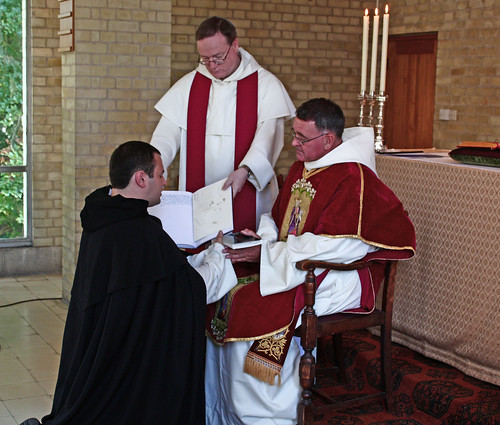





 On Saturday we packed up what we would need for the Vigil and Mass at Cuatro Vientos Aerodrome. Brother Lawrence had thankfully arranged that we could stay at a Dominican convent to avoid the afternoon sun. After lunch, siesta and Mass with the Filipino Dominican group with whom we had shared Atocha, we set out for the aerodrome. As we approached the area we were held up by police, who had closed the road. This turned out to be quite a good turn of luck as we were able to see the Popemobile drive past at close range. (One of our pilgrims caught it on his phone camera. it is available on his blog
On Saturday we packed up what we would need for the Vigil and Mass at Cuatro Vientos Aerodrome. Brother Lawrence had thankfully arranged that we could stay at a Dominican convent to avoid the afternoon sun. After lunch, siesta and Mass with the Filipino Dominican group with whom we had shared Atocha, we set out for the aerodrome. As we approached the area we were held up by police, who had closed the road. This turned out to be quite a good turn of luck as we were able to see the Popemobile drive past at close range. (One of our pilgrims caught it on his phone camera. it is available on his blog 











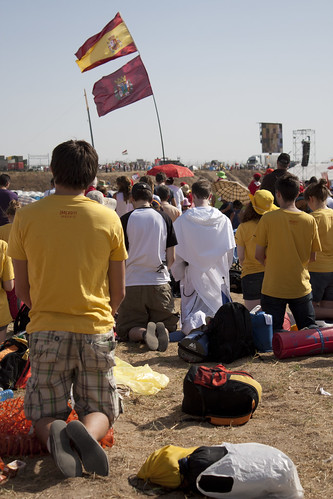
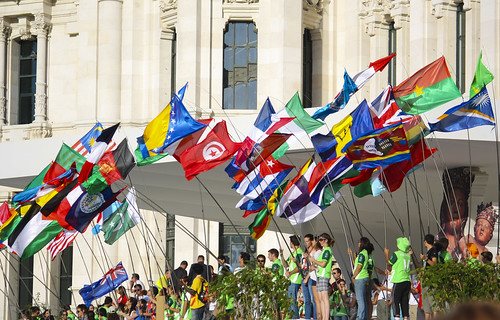






 On Friday evening Pope Benedict led The Stations of the Cross. The service used traditional Holy Week Spanish statues for each station. The prayerful hush of the crowd was as amazing as the variety of music which accompanied the carrying of the World Youth Day Cross to each station. In his reflection following the final station, Pope Benedict reminded the pilgrims that:
On Friday evening Pope Benedict led The Stations of the Cross. The service used traditional Holy Week Spanish statues for each station. The prayerful hush of the crowd was as amazing as the variety of music which accompanied the carrying of the World Youth Day Cross to each station. In his reflection following the final station, Pope Benedict reminded the pilgrims that: 







 Just before noon on Thursday our group were listening to a homily from Archbishop Timothy Dolan. During a pause the church bells started to ring. Suddenly the whole city was filled with the sound of church bells: The Pope had stepped upon Spanish soil. The Holy Father made his way to the Nunciature, where he rested before the official Papal welcoming ceremony in Plaza de Cibeles.
Just before noon on Thursday our group were listening to a homily from Archbishop Timothy Dolan. During a pause the church bells started to ring. Suddenly the whole city was filled with the sound of church bells: The Pope had stepped upon Spanish soil. The Holy Father made his way to the Nunciature, where he rested before the official Papal welcoming ceremony in Plaza de Cibeles.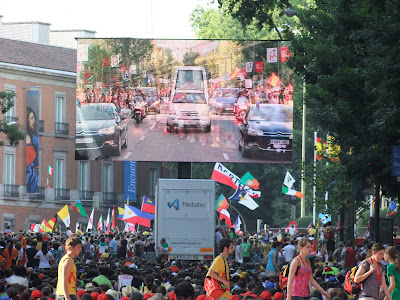



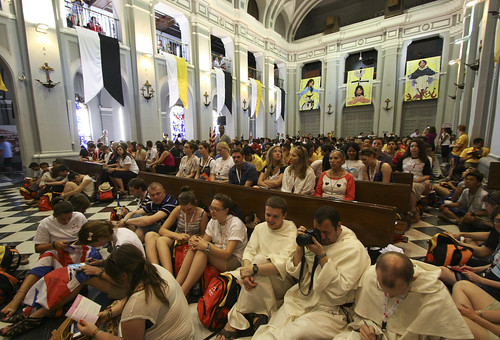 For the first three full days in Madrid, catechesis was given by the Bishops present to the various language groups. We were very fortunate to be next door to our English language centre in the Royal Basilica of Our Lady of Atocha, which is served by our Spanish Brothers.
For the first three full days in Madrid, catechesis was given by the Bishops present to the various language groups. We were very fortunate to be next door to our English language centre in the Royal Basilica of Our Lady of Atocha, which is served by our Spanish Brothers.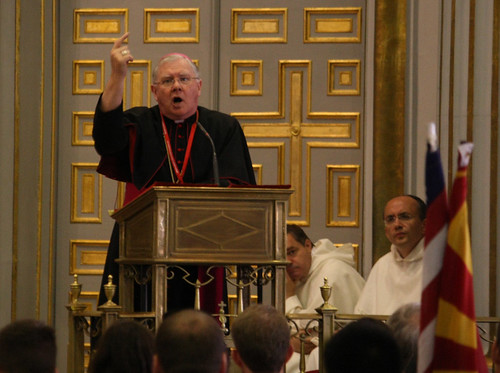 On the first morning we had the Archbishop of Canberra and Goulburn,Mark Coleridge address the assembled huddle. He warned that both secularists and religious people create "false-gods": Images and idols which they claim represent the true God. He encouraged the pilgrims to use World Youth Day as an opportunity to get to know and love the True God and to strip away the images and shadows that people have tried to restrict God to.
On the first morning we had the Archbishop of Canberra and Goulburn,Mark Coleridge address the assembled huddle. He warned that both secularists and religious people create "false-gods": Images and idols which they claim represent the true God. He encouraged the pilgrims to use World Youth Day as an opportunity to get to know and love the True God and to strip away the images and shadows that people have tried to restrict God to.
